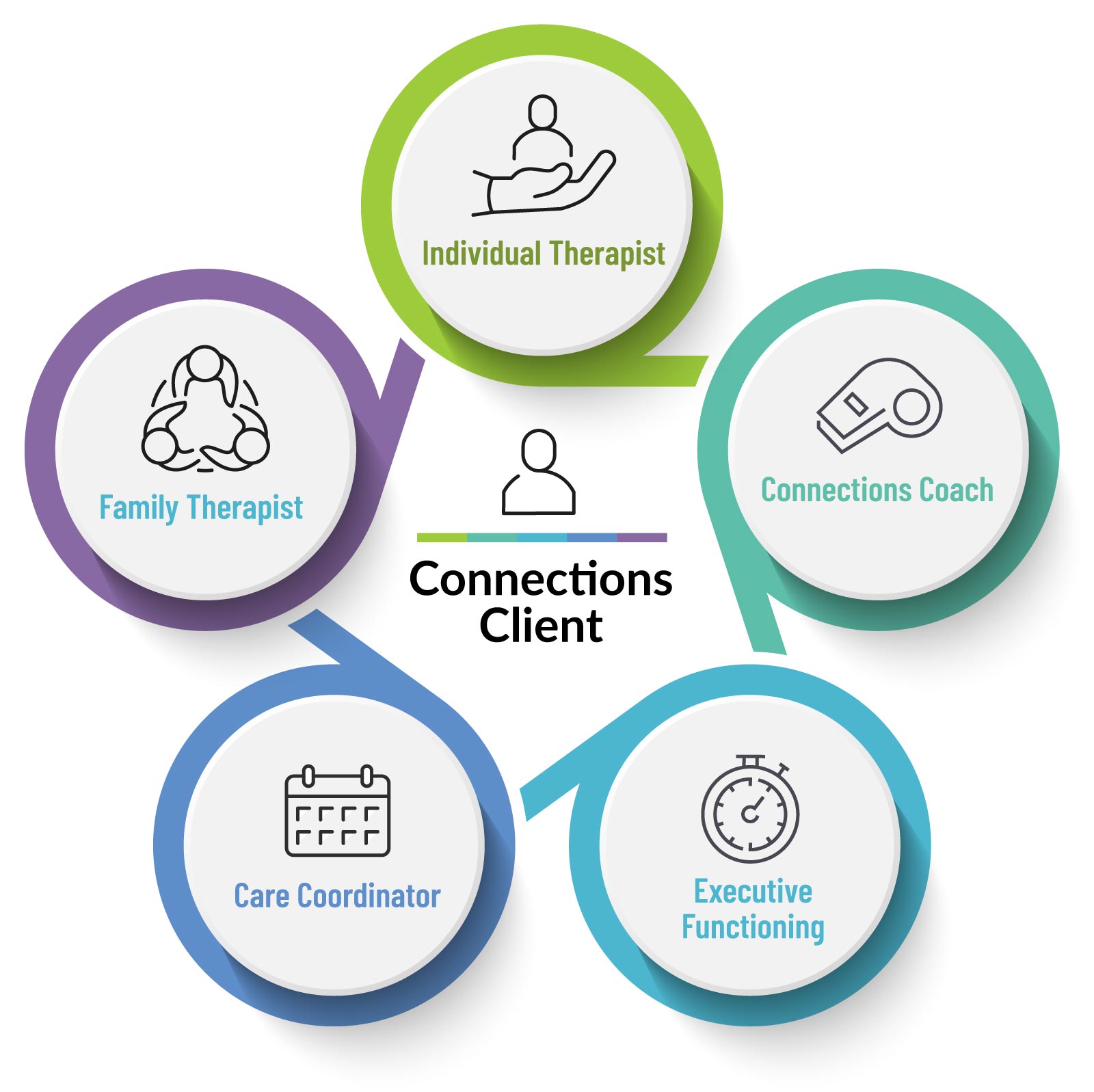Your Connections Team
The Connections Program is built upon the concepts of teamwork and community integration. Each week the client meets with their individual therapist, but that’s just the beginning. An entire team is assigned to each client. In addition to the individual therapist, there’s a family therapist, care coordinator, connections coach and a personal trainer. The client will have six to eight individual meetings per week with their various team members. Our team becomes an integrative part of our clients’ lives and thereby provides the support for our clients to better integrate into their community and become emotionally and physically healthier.
Each team member plays a critical role in the individual’s therapy:

Individual Therapist
The Role of the Individual Therapist is to establish a comfortable rapport with the client and thoroughly understand the issues preventing them from achieving functional independence. They provide what is commonly referred to as “traditional therapy” but in the process of providing that therapy they view the client in the context of the entire community in which they live. How did they get here? How were they raised? What are the dynamics of their family life, school/work life, social life? In many cases, the individual therapist also serves as the care coordinator.
Connections Coach
The Role of the Connections Coach is to do just what the name implies, helping the individual to reconnect with those activities that underly functional independence. Depending upon the age of and issues facing an individual, the connections counselor may help them write a resume, do homework, help with cooking meals and a variety of other daily activities. They may even hike together, plan camping trips together, participate in sporting events together. The connections coach will help with anything and plan any activities that can help the individual better reconnect with the system and environment in which they live.
Executive Functioning
Executive functioning is the ability to plan, adapt, manage time, develop organizational skills, multi-task and demonstrate self-control. Often individuals with dysfunction in this area struggle to follow plans, forget to complete important tasks, do not hand in homework, have trouble solving everyday problems or forget about scheduled appointments.
Care Coordinator
The Role of the Care Coordinator is to coordinate the entire CONNECTIONS program team and assure that the necessary action steps are being taken. Each week the care coordinator meets with our entire staff to review the case and gain perspectives on possible modifications.
Family Therapist
The Role of the Family Therapist is to examine the individual’s issues from the perspective and context of the family. Typically, the family therapist meets with family members alone one week and with the individual the next week. Oftentimes, the family therapist co-facilitates sessions with the individual therapist as we find this a very powerful way of treating the entire family.
Although the Connections program follows a structure, it is by no means a “stock” or “off-the-shelf” program. The therapy is flexible and allows for creativity. Many hours of discussion take place between our therapists and the family, our therapists and the individual and among our team of therapists before a customized program is crafted in conjunction with all key team members.
Client Stories
Our Connections Program has a definite structure, but this structure gives us the freedom to creatively address a variety of clients with a variety of issues. As you can see in the client stories below, we treat each client as a unique individual and the programs we design to address their issues are customized to meet their individual needs. Click on one of the links below to see actual programs and schedules for different types of individuals:
-

Kelsey, 6-Year-Old with Behavioral Issues »
-

Erik, a 10-Year-Old on the Spectrum »
-

Scott, 15-Year-Old Transitioning Back After Wilderness Program »
-

Christie, a 17-Year-Old Boarding School Student Demonstrating Self-Harming Behavior »
-

Angela, an 18-Year-Old College Student Suffering from ADHD »
-

Paige, a 19-Year-Old Struggling to Find Direction »
-

Derek, 25-Year-Old Failing to Launch »
-

Mike, a 35-Year-Old with Autism »
Exclusions, Limitations and Caveats
Since we are not a residential facility, there are certain situations or cases we cannot take. However, if you are uncertain about whether we can help address your situation, do not hesitate to call us. If your situation is one we cannot treat, we would be happy to direct you to a therapist or program that can. The following are situations we cannot treat:
- Actively Aggressive Individuals: Displaying a propensity to cause harm or violence towards self, others or property.
- Active Substance Abuse/Addiction: While we work with many recreational users, we do not treat those with a serious dependence on any substance.
- Unsafe Home: We do not treat victims of abuse, violence or neglect.
- Medical Intervention: We cannot provide medical intervention or dispense prescription medication or treat wounds or injuries, nor provide ambulation or hospitalization.
